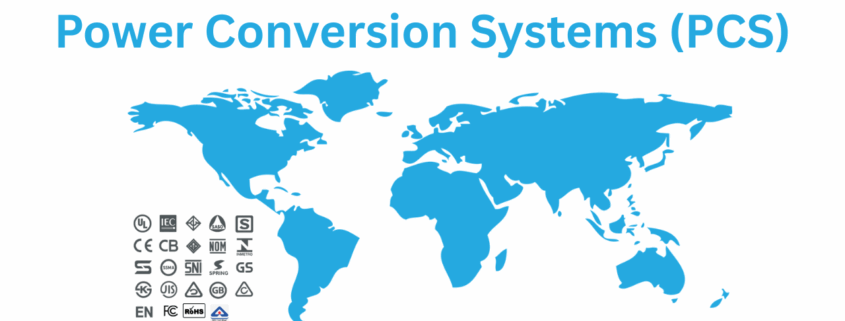PCS Certification Guide : In the booming Battery Energy Storage System (BESS) the Power Conversion System (PCS) plays a crucial role. It acts as the bidirectional bridge between batteries, renewable energy sources, and the electrical grid—converting DC to AC and vice versa.
However, no PCS can be legally sold or installed without meeting strict certification requirements . These certifications ensure:
Safety – Protecting operators, assets, and the grid.Compliance – Meeting local and international regulations.Market Access – Enabling entry into global markets without costly redesigns.This guide breaks down worldwide PCS certification requirements , region by region, so manufacturers, EPCs, and integrators know exactly what’s needed.
1. What Is a Power Conversion System (PCS)? A Power Conversion System is a high-efficiency electronic converter that:
Converts DC from batteries/PV to AC for the grid or loads. Converts AC from the grid to DC for battery charging. Supports grid stability functions such as frequency control and voltage regulation . If the BESS is the body, the PCS is the heart that pumps energy where it’s needed.
2. Worldwide PCS Certification Requirements A. International Certifications Standard Scope Why It Matters IEC 62109-1 & 62109-2 Safety of power converters for PV and ESS Ensures PCS meets operator and installer safety IEC 62477-1 Safety for power electronic converters Covers high-power PCS in BESS IEC 61000 Series EMC compliance Prevents harmful interference ISO 9001:2015 Quality management Ensures consistent production quality IEC CB Scheme Mutual recognition of test results Avoids repeated testing for multiple markets
B. North America Standard Scope Note UL 1741 & UL 1741 SB Inverters, converters, controllers for DER UL 1741 SB aligns with IEEE 1547-2018 IEEE 1547 & 1547.1 Grid interconnection Mandatory for PCS grid connection CSA C22.2 Safety requirements for Canada Harmonized with UL standards
C. Europe Standard Scope Note EN 50549-1 / -2 Generating plant requirements Covers PCS grid integration EN 62477-1 Safety for power electronics Required for high-voltage PCS EN 61000 EMC compliance Prevents interference G99 (UK)Grid code compliance UK-specific requirement
D. Australia & New Zealand Standard Scope Note AS/NZS 4777.2 Grid-connected inverter requirements Includes PCS RCM Mark EMC & safety Required before market entry
E. South Africa Standard Scope Note NRS 097-2 Grid connection rules Addresses voltage, frequency, harmonics
F. China Standard Scope Note GB/T 34120 & GB/T 34133 PCS safety & performance Required for ESS & PCS GB/T 29319 EMC standards Local testing required
G. India Standard Scope Note BIS IS 16221 & IS 16270 PCS safety Mandatory BIS registration CEA Grid Code Interconnection rules Adapted for Indian grid
H. Japan Standard Scope Note JIS C 8961 & C 8999 PCS performance & safety Japanese Industrial Standards JET Certification Electrical & performance safety Required for PCS sales PPSA Compliance Grid approval Utility-specific process
I. South Korea Standard Scope Note KS C 8567 / KS C 8568 PCS safety standards Korean Standards KC Mark EMC & safety Mandatory product mark KEPIC / KERI Testing Grid compliance Overseen by KESCO
J. Southeast Asia Thailand Standard Scope Note TISI Certification PCS safety Thailand Industrial Standards Institute MEA/PEA Grid Code Utility approval For PCS connection to the grid
Singapore Standard Scope Note SPRING / Enterprise SG Electrical safety National compliance mark EMA Grid Connection Energy Market Authority approval Required for grid-tied PCS
Indonesia Standard Scope Note SNI Certification Indonesian National Standard Safety & quality compliance PLN Grid Code Utility connection rules Approval from PLN
K. Middle East United Arab Emirates (UAE) Standard Scope Note ESMA Certification Safety & EMC Emirates Authority DEWA / ADWEA Grid Code Utility compliance Grid-tied PCS requirement
Saudi Arabia Standard Scope Note SASO Certification Safety & quality Saudi Standards Org. SEC Grid Connection Utility approval Saudi Electricity Company rules
Qatar, Oman, Kuwait Typically adopt IEC standards + local utility grid codes . L. Latin America Country Standard Note Brazil INMETRO + ONS Grid Code Safety & grid compliance Chile SEC Approval + Grid Code Energy regulatory approval Mexico NOM + CFE Grid Rules Safety & interconnection
3. International Certification Pathways The IECEE CB Scheme simplifies global compliance:
Test once in a CB-certified lab. Use the report for multiple country approvals . Cuts time-to-market significantly. 4. PCS Certification Process Identify Target Markets Match Applicable Standards Pre-Test in Internal Lab Submit to Accredited Testing Body Receive Certificates Maintain Compliance via periodic re-testing.5. Challenges & Future Trends Challenges
Varying grid codes by region Rapid updates to standards (e.g., IEEE 1547) New cybersecurity requirements Trends
Cybersecurity Compliance (IEC 62443)Green Certification Labels Gradual harmonization of standards globally Conclusion The PCS is the gateway between your Battery energy storage system and the grid —but without the right certifications, it’s just an expensive box. global PCS requirements early , manufacturers and integrators can avoid delays, reduce costs, and enter multiple markets faster .


